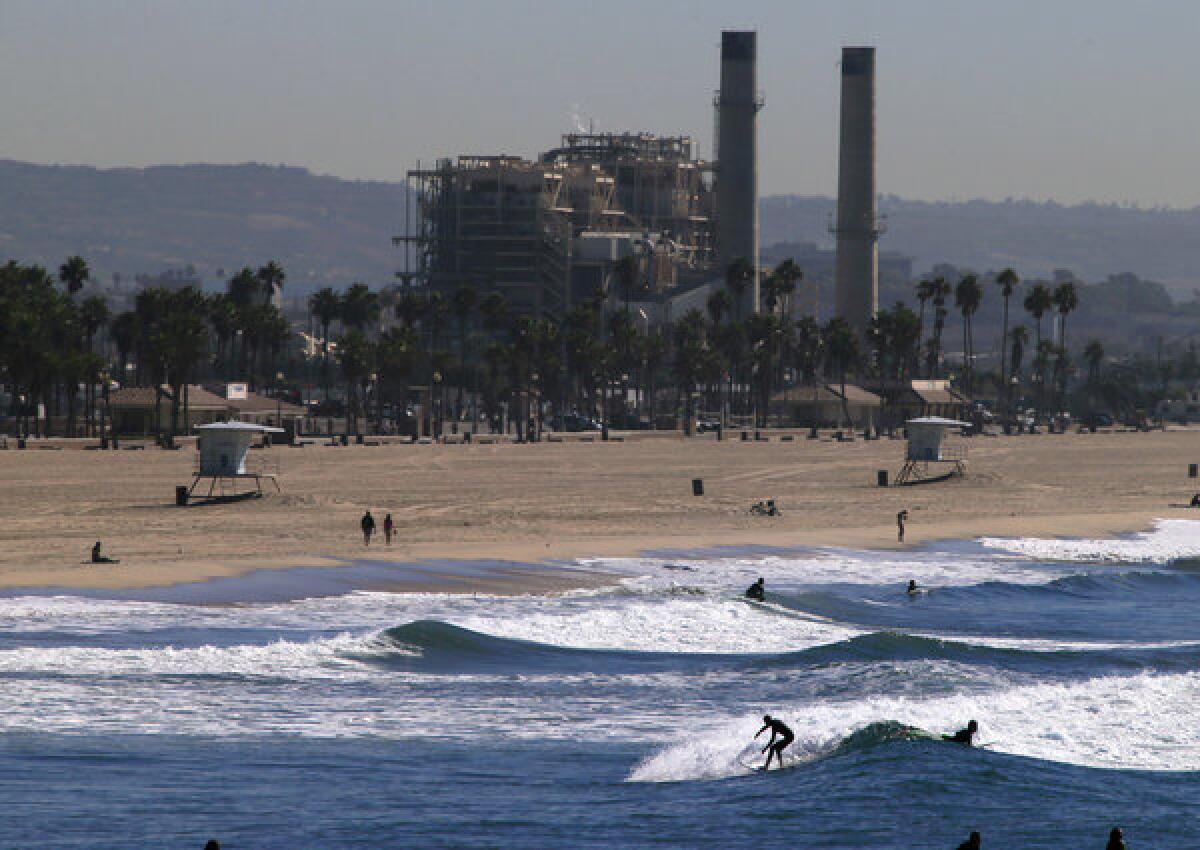New state rules a hurdle for Poseidon seawater desalination plans

- Share via
At a recent state Coastal Commission hearing on a proposed seawater desalination plant in Huntington Beach, the debate was not about the merits of using the Pacific Ocean as a water source.
A parade of local elected officials and representatives of Orange County congressmen urged approval of the project last week, saying it could play an important role in diversifying Southern California’s water supply.
Even most opponents of Poseidon Resources’ proposal said they were not opposed to any desalination on the California coast.
Instead the project’s main sticking point involved the type of ocean intake the company wants to use for the $900 million project, which would be one of the largest seawater desalters in the nation.
Poseidon’s problem is that changing state regulations have undercut its longstanding strategy of building desalination facilities next to existing coastal power plants so the desalters can use the ocean intakes that provide cooling water for the power stations.
Poseidon followed that approach with a large desalination plant, now under construction in San Diego County, that was approved by the Coastal Commission in 2007.
But three years ago the State Water Resources Control Board decided seawater cooling up and down the state was killing too much marine life and directed most coastal power plants to switch to other cooling technologies.
The AES Huntington Beach Generating Station next to the Poseidon site on Pacific Coast Highway plans to change its cooling system within the next five years. But Poseidon wants to keep using the station’s open ocean intake and discharge pipes after the switch.
“That is not what we want to be doing,” Commissioner Dayna Bochco said at the Nov. 13 hearing in Newport Beach. “I think the substantial evidence in the staff and opponents’ briefs shows the potential for very severe marine life harm.”
The commission staff wants Poseidon to build offshore, subsurface intakes just below the seafloor to draw water for the desalter, a technique the staff says would have minimal impact on plankton, fish eggs and larvae that are lethally entrained en masse by open ocean pipes.
Poseidon says such a requirement would kill the project by adding $270 million in costs. Company officials also argue that subsurface intakes have never been used on the scale of the proposed plant, would not work in the type of seabed sediment found off of Huntington Beach and would require the excavation of 64 acres of seafloor.
Commissioner Jana Zimmer was not impressed with that argument, lamenting that other sites for the plant had not been seriously considered. “If indeed we cannot do the environmentally superior alternative at this site, then in my opinion this is the wrong site,” she said.
Zimmer also chastised Poseidon for providing technical memos written by experts who had consulted for Poseidon or, in one case, was a former company executive. “It just starts to feel inappropriate that none of this was disclosed,” she said.
Poseidon Vice President Scott Maloni later defended the company’s choice of experts.
“Attempts to disparage the credibility of the technical consultants who have worked on the Huntington Beach project are a politically motivated ploy to draw attention away from the project’s merits and its insignificant marine life impacts,” Maloni said in an email response to The Times’ request for comment.
He added that the former executive, Nikolay Voutchkov, “no longer has a financial interest in the Huntington Beach project or in Poseidon.”
Poseidon argues that using an open ocean intake for the desalter would destroy only a tiny fraction of the sea life along that stretch of the coast. Maloni said the commission staff was “overstating the significance of the entrainment effects.”
Even commissioners who seemed to favor the proposal said they didn’t have enough information to decide whether subsurface intakes were feasible and practical at the Huntington Beach site.
In the end, after a day-long hearing before an overflow crowd of sign-waving supporters and opponents, the commission decided to put off its vote on the project to give the company more time to conduct offshore studies that could answer key questions.
It will likely be months before Poseidon returns to the commission with information that could decide the project’s fate.
bettina.boxall@latimes.com
Twitter:@boxall







